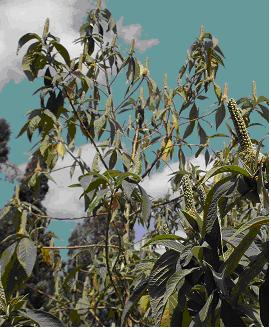More and more research showed that plant secondary metabolites have a variety of ecological functions such as defense, attraction, signaling and UV protection. Researchers LI Shenghong and his colleagues, under the support of starting funding for talent introduction of Kunming Institute of Botany, the independent projects of State Key Laboratory and National Natural Science Foundation, established the Chemical Ecology Research Group and carried out studies on the ecological functions of plant secondary metabolites. The Group has studied the secondary metabolites of the invasive plant Eupatorium adenophorum and their ecological functions, and found that only a small number of its major components (cadinene sesquiterpenes) showed weak allelopathic effect to the seed germination of Arabidopsis thaliana, but most terpenoids have no significant effect, which is not consistent with previous reports at home and abroad. This indicated that terpenoids are not the major allelopathic substances of this plant while non-terpenoids (such as phenolics) might be. The above results have been published on Journal of Agricultural and Food Chemistry (2009, 57: 478-482). Further investigation on the allelochemicals and the defensive function of terpenoids of this invasive plant is currently underway. Meanwhile, the Group is also investigating the secondary metabolites of Leucosceptrum canum, a large woody and colored nectar plant of Labiatae family, and their ecological significance, which will help to reveal the evolutional relationship between the secondary metabolites of this plant and its special traits-“large woody” and “colored nectar”.

Eupatorium adenophorum

Leucosceptrum canum




